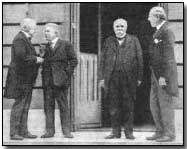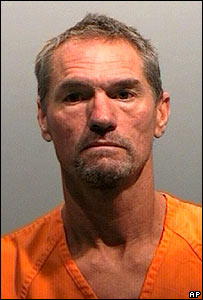People Of The Lie
Hubby and I had dinner with one of his colleagues and colleague's wife the other night. Other engineer-lawyer couples make for entertaining dinner discussion and this couple never fails to deliver. Wife is an uber-liberal public defender with an unending catalog of fascinating stories from work.
Dinner conversation begins with the easy topics but, of course, inevitably leads to religion and politics. Wife explained that, although she is a liberal, she can respect a Republican with divergent views so long as his or her opinions have logical foundations. In her analytical, lawyerly way, Wife described an exchange she had with a Republican friend of hers in which they tried to pinpoint their point of divergence. "After going back and forth, struggling to find the fundamental different between our political beliefs, we found it - he thinks there are people who are irredeemably evil and I do not."
"Interesting", I responded, "I tend to agree with your Republican friend".
Free Agency Rules and I recently debated the concept of evil and several of the points overlapped with my discussion with Wife.
"People Of The Lie", by Christian psychiatrist Scott Peck, is the beginning point for a real discussion about evil. In this thought-provoking work, Peck approached the concept of evil from a psychiatric perspective -- evil is the opposite of life (as evil is live spelled backwards), i.e. it is anything that has its purpose to distort reality.
The symptoms of an evil personality disorder are
- consistent destructive scapegoating behavior, which may often be quite subtle.
- excessive, albeit covert, intolerance to criticism and other forms of narcissistic injury.
- pronounced concern with one's public image and self-image of respectability, contributing to a a stability of lifestyle but also to a pretentiousness and denial of hateful feelings or vengeful motives.
- intellectual deviousness, with an increased likelihood of disturbance of thinking in times of stress.
Are they people beyond redemption?
Applying Peck's definition and my own observations in life, I remain of the belief that there are people of the lie who are beyond redemption absent some drastic remedy such as a lobotomy or suffering brain damage.
We can point to the easy examples of evil such as Cheney, Stalin, Mao and Hitler, but those are cliche extremes. It is the local, everyday evil with which we contend that is of interest to me. No matter how hard I try, I will never be able to grasp what motivates a grown man to adorn a white cloth and burn crosses in someone's yard. Perhaps there are KKK members who were young and immature, but for such an organization to survive, there must necessarily be a core of fanatics who live and die for the cause. Those people are evil. The Catholic priest who, in the morning, doles out the bread and wine to the masses and, in the afternoon, shares the real treats with the altar boys. Evil. Consistent destructive scapegoating and excessive intolerance to criticism are part and parcel of this administration and the media lapdogs at Fox News. A fundamental lack of objectivity and honesty, regardless of what the facts are. Evil. Oh, and add Rush Limbaugh to the list for mocking Michael J. Fox. Super Evil.
The human psyche is like a computer hard drive - it does not matter if you hit the delete button, the information is there and will always be there. Permanently. You can try to put new information on top of it, but the only way to keep the old information from fighting its way to the top is through consistent effort and introspection. As most narcissists think they are perfect and, thus, do not see themselves as having a problem that requires consistent effort to fix, they will never put in the work that is required to overcome the evil that is who they are.
They are beyond redemption.









